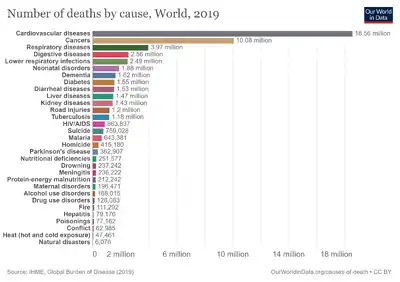Saturated fat and cardiovascular disease

Most medical, scientific, heart-health, governmental, and professional authorities agree that saturated fat is a risk factor for cardiovascular disease, including the World Health Organization,[1] the Food and Nutrition Board of the National Academy of Medicine,[2] the Academy of Nutrition and Dietetics,[3] the Dietitians of Canada,[3] the Association of UK Dietitians,[4] the American Heart Association,[5] the British Heart Foundation,[6] the Heart and Stroke Foundation of Canada,[7] the World Heart Federation,[8] the British National Health Service,[9] the United States Food and Drug Administration,[10] and European Food Safety Authority.[11]
There is moderate quality evidence that reducing the proportion of saturated fat in the diet, and replacing it with unsaturated fats over a period of at least two years, leads to a reduction in the risk of cardiovascular disease.[12]
History
The hypothesis that saturated fat has a detrimental effect on human health gained prominence in the 1950s as a result of the work of Ancel Keys, who postulated a correlation between circulating cholesterol levels and cardiovascular disease, and initiated a study of Minnesota businessmen (the first prospective study of CVD).[13]
Keys conducted a multiyear Seven Countries Study,[14] which influenced the AHA to become the first clinical association to recommend reductions in dietary saturated fat (and dietary cholesterol) to lower the risk of heart disease.[15] This historic recommendation was reported on the cover of Time Magazine in 1961.[16]
Reviews
A meta-analysis in 2014 concluded that "current evidence does not clearly support cardiovascular guidelines that encourage high consumption of polyunsaturated fatty acids and low consumption of total saturated fats".[17] A scientific panel for the American Heart Association stated that the 2014 analysis "mistakenly concluded that there was no significant effect of saturated fat intake on CVD risk", and recommended that decreasing saturated fat intake and increasing consumption of monounsaturated fats and polyunsaturated fats could lower the risk of cardiovascular diseases by about 30%.[5] A 2020 review found that reducing saturated fat intake for at least two years reduced cardiovascular risk factors, mainly by replacing saturated fat with sources of polyunsaturated fat or carbohydrates.[12]
See also
References
- ↑ Joint WHO/FAO Expert Consultation (2003). Diet, Nutrition and the Prevention of Chronic Diseases (WHO technical report series 916) (PDF). World Health Organization. pp. 81–94. ISBN 978-92-4-120916-8. Archived from the original (PDF) on 24 July 2015. Retrieved 11 March 2011.
- ↑ Food and Nutrition Board (2005). "10: Dietary Fats: Total Fat and Fatty Acids". Dietary Reference Intakes for Energy, Carbohydrate, Fiber, Fat, Fatty Acids, Cholesterol, Protein, and Amino Acids. Washington, DC: National Academies Press. p. 422. Archived from the original on 9 November 2014. Retrieved 25 July 2017.
- 1 2 Kris-Etherton, PM; Innis, S; American Dietetic, Association; Dietitians Of, Canada (September 2007). "Position of the American Dietetic Association and Dietitians of Canada: Dietary Fatty Acids" (PDF). Journal of the American Dietetic Association. 107 (9): 1599–1611 [1603]. doi:10.1016/j.jada.2007.07.024. PMID 17936958. S2CID 21213410. Archived from the original (PDF) on 27 February 2019. Retrieved 18 March 2011.
- ↑ "Food Fact Sheet - Cholesterol" (PDF). Association of UK Dietitians. 1 December 2018. Archived (PDF) from the original on 1 February 2012. Retrieved 28 July 2019.
- 1 2 Sacks, Frank M.; Lichtenstein, Alice H.; Wu, Jason H.Y.; Appel, Lawrence J.; Creager, Mark A.; Kris-Etherton, Penny M.; Miller, Michael; Rimm, Eric B.; Rudel, Lawrence L.; Robinson, Jennifer G.; Stone, Neil J.; Van Horn, Linda V. (15 June 2017). "Dietary Fats and Cardiovascular Disease: A Presidential Advisory From the American Heart Association". Circulation. 136 (3): e1–e23. doi:10.1161/CIR.0000000000000510. PMID 28620111. S2CID 367602.
- ↑ "Fats explained". Archived from the original on 26 December 2017. Retrieved 3 May 2012.
- ↑ "Dietary fats, oils and cholesterol". Heart and Stroke Foundation of Canada. Archived from the original on 26 July 2017. Retrieved 25 July 2017.
- ↑ "Cardiovascular Risk Factors". World Heart Federation. 30 May 2017. Archived from the original on 10 May 2012. Retrieved 26 August 2022.
- ↑ "Eat less saturated fat". National Health Service. 1 June 2017. Archived from the original on 24 April 2015. Retrieved 28 July 2019.
- ↑ "Nutrition Facts at a Glance - Nutrients: Saturated Fat". Food and Drug Administration. 22 December 2009. Archived from the original on 17 September 2011. Retrieved 3 May 2012.
- ↑ "Scientific Opinion on Dietary Reference Values for fats, including saturated fatty acids, polyunsaturated fatty acids, monounsaturated fatty acids, trans fatty acids, and cholesterol". European Food Safety Authority. 25 March 2010. Archived from the original on 6 September 2015. Retrieved 3 May 2012.
- 1 2 Hooper, Lee; Martin, Nicole; Jimoh, Oluseyi F.; Kirk, Christian; Foster, Eve; Abdelhamid, Asmaa S. (21 August 2020). "Reduction in saturated fat intake for cardiovascular disease". The Cochrane Database of Systematic Reviews. 8: CD011737. doi:10.1002/14651858.CD011737.pub3. ISSN 1469-493X. PMID 32827219. Archived from the original on 8 October 2020. Retrieved 26 August 2022.
- ↑ Keys, Ancel; Taylor, Henry Longstreet; Blackburn, Henry; Brozek, Josef; Anderson, Joseph T.; Simonson, Ernst (1 September 1963). "Coronary Heart Disease among Minnesota Business and Professional Men Followed Fifteen Years". Circulation. 28 (3): 381–95. doi:10.1161/01.cir.28.3.381. PMID 14059458. Archived from the original on 27 May 2020. Retrieved 26 August 2022.
- ↑ Keys, Ancel (1980). Seven Countries: A Multivariate Analysis of Death and Coronary Heart Disease. Harvard University Press. ISBN 978-0-674-80237-7.
- ↑ "Dietary Fat and Its Relation to Heart Attacks and Strokes". JAMA. 175 (5): 389–391. 4 February 1961. doi:10.1001/jama.1961.63040050001011. PMID 14447694.
- ↑ "TIME Magazine Cover: Ancel Keys". TIME.com. 13 January 1961. Archived from the original on 20 February 2019. Retrieved 23 July 2017.
- ↑ Chowdhury Rajiv; Warnakula Samantha; Kunutsor Setor; Crowe Francesca; Ward Heather A.; Johnson Laura; Franco Oscar H.; Butterworth Adam S.; Forouhi Nita G.; Thompson Simon G.; Khaw Kay-Tee; Mozaffarian Dariush; Danesh John; Di Angelantonio Emanuele (2014). "Association of Dietary, Circulating, and Supplement Fatty Acids With Coronary Risk: A Systematic Review and Meta-analysis". Annals of Internal Medicine. 160 (6): 398–406. doi:10.7326/M13-1788. PMID 24723079.